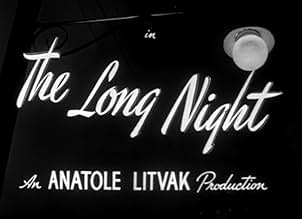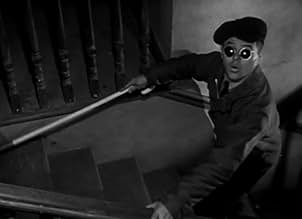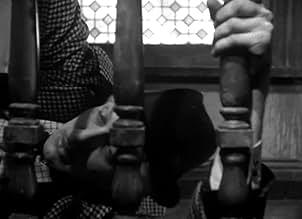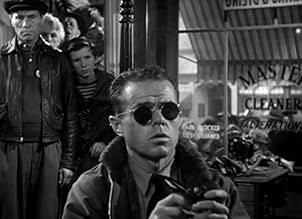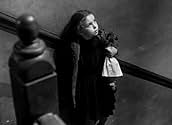CALIFICACIÓN DE IMDb
6.5/10
2.3 k
TU CALIFICACIÓN
Agrega una trama en tu idiomaPolice surround the apartment of apparent murderer Joe Adams, who refuses to surrender although escape appears impossible. During the siege, Joe reflects on the circumstances that led him to... Leer todoPolice surround the apartment of apparent murderer Joe Adams, who refuses to surrender although escape appears impossible. During the siege, Joe reflects on the circumstances that led him to this situation.Police surround the apartment of apparent murderer Joe Adams, who refuses to surrender although escape appears impossible. During the siege, Joe reflects on the circumstances that led him to this situation.
- Dirección
- Guionistas
- Elenco
- Premios
- 4 premios ganados en total
Melinda Byron
- Peggy
- (as Patty King)
Davis Roberts
- Freddie
- (as Robert A. Davis)
Fred Aldrich
- Ticket Taker
- (sin créditos)
Murray Alper
- Mac - Bartender
- (sin créditos)
Bobby Barber
- Nightclub Patron
- (sin créditos)
Vangie Beilby
- Audience Member
- (sin créditos)
Brooks Benedict
- Audience Member
- (sin créditos)
Gladys Blake
- Millie - Saloon Waitress
- (sin créditos)
- Dirección
- Guionistas
- Todo el elenco y el equipo
- Producción, taquilla y más en IMDbPro
Opiniones destacadas
This is an example of a very BAD remake.Proof positive that great actors and good directors do not necessarily mean good work.You have got to bear in mind that Carné/Prévert's "Le JOur se Lève" was made in 1939 at a time when France was not smiling .The movie was so depressing it was quickly forbidden by the military censorship (see my review of the French film for more details).The movie was an exact reflection of its time.Out of that context it's another melodrama.Besides,deprived
of Prévert's lines -when a poetic dialog is translated into another language,there's always a problem- it loses much of its appeal)
Although one of the best actors in American cinema,Henry Fonda could not succeed in Gabin's plebeian part.Ann Dvorak is the most adequate choice since her swagger imitates Arletty's.
And who could forgive the new ending?
of Prévert's lines -when a poetic dialog is translated into another language,there's always a problem- it loses much of its appeal)
Although one of the best actors in American cinema,Henry Fonda could not succeed in Gabin's plebeian part.Ann Dvorak is the most adequate choice since her swagger imitates Arletty's.
And who could forgive the new ending?
I've never seen the original French film upon which this film was based, but I can tell you I kept waiting for a plot line payoff that never came. It has everything going for it - solid cast giving good believable performances, good direction, even a good speech that Fonda's character delivers from this broken out window as he is under siege by the police that gives us some insight into what it's like for an average guy who has returned home from years of killing and seeing killing in the war expected to pick up where he left off. But ultimately, I never see anything that Fonda's character, factory laborer Joe Adams, has been put through as far as shock or emotional torment or even disillusionment that would justifiably cause him to kill a man. Is Vincent Price's character Maximillian eloquently taunting and creepy? Yes, and in a way that Price excelled at over the years starting in noirs and proceeding on into his horror films. However, at no time does he do anything that would drive anybody to do more than shoo him away or stuff earplugs in their ears or possibly call the ASPCA (You'll have to watch the film to understand this last remark). I'm giving this film a five just for the fact that I believe the production code is the reason any hard edges that seem to be just under the surface never appear. I'm almost positive the script would have gone further if the censors would have allowed it to be so.
The real point of interest to me was the action of the police, who behave a lot like the fascists that Joe Adams spent years fighting in WWII. Sure they have a murderer holed up in his rented room, but he's holding no hostages, they've emptied the building, and still they spray him twice with automatic gunfire unannounced - once from the outside into his window, then from the stairwell into the door. When he pushes a sturdy dresser against the door and they realize they can't force their way in THEN they try talking to Joe, starting with the line "We're not fooling"?? No kidding! After Fonda's speech to the crowd, once the crowd starts voicing their support for Joe and promising financial help with a lawyer the police form a line and practically trample the crowd forcing them out of the street. I don't know if the heavy handedness of the police was something that Litvak wanted the audience to notice, but it was something I noticed.
I'd recommend this one just for the good performances and atmosphere and some imagery you don't see that much in films immediately after WWII, but don't expect something shocking or even interesting to happen just because of all of the talent assembled here.
The real point of interest to me was the action of the police, who behave a lot like the fascists that Joe Adams spent years fighting in WWII. Sure they have a murderer holed up in his rented room, but he's holding no hostages, they've emptied the building, and still they spray him twice with automatic gunfire unannounced - once from the outside into his window, then from the stairwell into the door. When he pushes a sturdy dresser against the door and they realize they can't force their way in THEN they try talking to Joe, starting with the line "We're not fooling"?? No kidding! After Fonda's speech to the crowd, once the crowd starts voicing their support for Joe and promising financial help with a lawyer the police form a line and practically trample the crowd forcing them out of the street. I don't know if the heavy handedness of the police was something that Litvak wanted the audience to notice, but it was something I noticed.
I'd recommend this one just for the good performances and atmosphere and some imagery you don't see that much in films immediately after WWII, but don't expect something shocking or even interesting to happen just because of all of the talent assembled here.
10jakob_34
A remake of Marcel Carnes French film Le Jour Se Leve, with excellent performancies, Henry Fonda is very good in the leading role and Vincent Price at his smarmiest. Barbara Bel Geddes makes a very good debut as movie actress. The director Anatole Litvak have done the film with great flair, it has a nice feel to it and is interesting and dramatic. I think this film is very underrated and should receive more attention than it does, Sol Politos camerawork is very interesting and give some scenes a claustrophobic feeling with his use of light and shadow. If you like atmospheric, dramatic noir dramas I can recommend this one.
9tavm
When I went to my local library to check some DVDs, I stumbled onto this obscure flick that starred Henry Fonda, Barbara Bel Geddes (in her film debut), Vincent Price, and Ann Dvorak. With that cast (I just remembered that Elisa Cook, Jr. has a memorable role as a blind man here), with Anatole Litvak as director, and Dimitri Tiomkin conducting his score (as well as some Beethoven pieces spread among it), I expected an excellent suspenseful movie and I got it! Well, maybe nearly so since the speech Ms. Bel Geddes says to Fonda at the end is obviously contrived to address the audience as well as the leading character about the faith of people. Otherwise, the dialogue was mostly spot-on especially the heated exchanges between Fonda and Price who, as usual, is absolutely charming even in his creepiness. And Ms. Dvorak marks a nice contrast with her cynicism as compared with Ms. Bel Geddes' optimism. Fonda himself goes the full range of emotions whether during the flashbacks or his present condition of being holed up in his apartment while the police are waiting outside. So for all that, I highly recommend The Long Night.
Holed up in his apartment after committing a murder, a depressed war veteran engages in a gun battle with the police while reflecting on the circumstances that led to the situation. It sounds intriguing on paper, but the script is rather sloppy, featuring flashbacks within flashbacks. It's basically an uninteresting story with dull characters. Fonda tries to make something of his role, but is given little to work with. Bel Geddes makes an impressive film debut, and Dvorak and Price are also fine, but they are all let down by the screenplay. Litvak has made better films, but here his staging of police work and the shootout is poorly executed.
¿Sabías que…?
- TriviaFilm debut of Barbara Bel Geddes. She was signed to a seven-year contract with RKO after this film. Director Anatole Litvak cast her after seeing her on Broadway as the female lead in "Deep Are the Roots", which played at the Fulton Theatre for 477 performances beginning 26 September 1945.
- ErroresWhen Joe from inside his apartment shoots at the cops who are standing outside his door; it leaves bullet holes in the door. But on a following cut after speaking with the little girl and going back into his apartment; there are no bullet holes on the interior side of the door.
- Citas
Maximilian: [to Jo-Ann] You have sharp nails like a little animal. Maybe that's what I like about you.
- Créditos curiososOpening card: "...the night is long That never finds the day..." William Shakespeare, Macbeth, Act IV, Scene III
- ConexionesFeatured in Henry Fonda: The Man and His Movies (1982)
Selecciones populares
Inicia sesión para calificar y agrega a la lista de videos para obtener recomendaciones personalizadas
- How long is The Long Night?Con tecnología de Alexa
Detalles
Taquilla
- Total en EE. UU. y Canadá
- USD 1,000,000
- Tiempo de ejecución
- 1h 41min(101 min)
- Color
- Relación de aspecto
- 1.37 : 1
Contribuir a esta página
Sugiere una edición o agrega el contenido que falta


